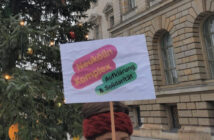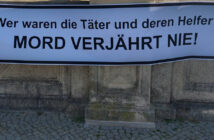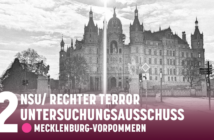On the first day of the trial, the defense attorneys of Beate Zschäpe und Ralf Wohlleben read for hours their motions for bias against the court. After this, Judge Götzl adjourned the proceedings until May 14th. In the visitor’s gallery two Neo-Nazis turned up, including the brother of the accused André E.
The main trial in the case against Beate Zschäpe, Ralf Wohlleben, Holger G., André E. and Carsten S began at 10:30 a.m. in front of the 6th Criminal Division of the High Regional Court (OLG) Munich.
Selected photographers and cameramen had more than twenty minutes to take pictures of the accused. Beate Zschäpe kept her back turned to the press for most of the time. The accused Ralf Wohlleben appeared unimpressed.
At around 10:30 the judges entered the courtroom. After the instructions of the interpreters of the trial, Judge Götzl, the presiding Judge of the High Regional Court, goes through the attendance: First the defendants Beate Zschäpe (with lawyer Heer, lawyer Stahl, and lawyer Sturm), André E. (with lawyer Kaiser and lawyer Freitag), Ralf Wohlleben (with lawyer Klemke and lawyer Schneiders), Carsten S. (with lawyer Hösl and lawyer Pausch), Holger G. (with lawyer Hachmeister and lawyer Rokni-Yazdi). Then the Attorney General with the Federal Public Prosecutor Dr. Herbert Diemar, Annett Greger, Jochen Weingarten and Stefan Schmidt as well as the many plaintiffs and their legal advisors. On the Judge’s bench sitting next to Judge Götzl, Judge of the High Regional Court Dr. Fischer, Judge of the High Regional Court Kuchenbauer, Judge of the High Regional Court Dr. Lang, Judge of the High Regional Court Odersky and the supplementary Judges Feistkorn, Kramer and Prechsl.
Attorney Stahl asks presiding Judge Götzl, how he intends to handle the challenging motion of Beate Zschäpe’s, which they had faxed the court office of the High Regional Court last Saturday at 7:00 p.m. Immediately a dispute develops between Götzl, of whom this dispute is claiming bias, and Attorney Stahl. Götzl claims to have determined the motion’s arrival at the start today’s proceedings at 8:00 a.m. Thereafter, Götzl points out that the current start of the trial process constituted an urgent act to not allow a delay, and furthermore he wants the faxed motion to be newly addressed. Götzl asks: “Do you want to repeat the placed motion by reading it aloud?” At the request of the defense a recess is called for consultation. After the recess Attorney Stahl reads the challenging motion.
Their challenging motion against the Presiding Judge Götzl by Stahl and Co. was founded on Gözel’s directive of the police at the proceedings to conduct a search of the representatives of the defendants of the co-plaintiffs. The search of persons and screening of bags was disproportionate and discriminates against the defense lawyers, especially since the arrangement does not equally apply to the representatives of the Federal Prosecutor’s Office, clerks, justice ministers, and security forces, all of whom were not searched. Götzl had founded this arrangement, among other things, in the spring of 2013, because attacks from the extreme left or right spectrum were possible; that the NSU had ended with the death of Uwe Mundlos and Uwe Bönhardt was of no relevance here.
Attorney Stahl disapproved of the differentiation between the lawyers and the others concerned with the trial who were not searched. It was a “completely absurd assumption” that the police officers and justice officers were not subject to this black mail, claimed Stahl. They also could be coerced into smuggling dangerous items into the hall. With all participants there is a risk that they will be slipped items. The arrangement of the trial police was therefore unilaterally and arbitrarily discriminatory against the lawyers of the defense. On these grounds the defense formulated doubts about the impartiality of Judge Götzl and discussed the concern about bias.
In statements the representatives of the co-plaintiffs Attorney Reinecke and Attorney Schön described the motion as purely a time delay tactic. This could have been already submitted on April 17th. Attorney Schön spoke of the “Most terrible crimes of German Post-War History with Fascist motive,” and saw the procrastination tactics of the motions as absurd and to be rejected.
Sturm und Heer countered sharply: The rights and the suffering of the victims would indeed be seen. Then Sturm claimed they should be emotionally obliged. Attorney Heer complained “when we put in a motion you throw it back at us.”
This was followed by an afternoon pause until 1:40.
After the break the Attorney General requests that the motion be dismissed and rejected as unfounded. From the perspective of a reasonable defendant this motion was not likely to establish a bias. Nothing resulting from the explanations would indicate a bias, or prejudice. From the side of the representatives of the co-plaintiffs, they say that the search warrants issued by Götzl may have been a legal mistake, but did not amount to a foundation for a motion of bias.
The presiding Judge Götzl declared a continuation of the main trail and postponed the decision on the Motion of Bias from Zschäpe for the time being. The beginning of the main trail was urgent and intolerant of delay tactics, especially because it related to the main trial itself. An immediate decision would necessitate the suspension of the trial.
Attorney Klemke objected to the ruling of Götlz and wants a formal senate resolution. Beate Zschäpe’s attorney Heer here supports the defense of Ralf Wohlleben. As before there is still a lack of agreement about if the faxed motion from Zschäpe and the request of the defense lawyers, read aloud at the trail, must be treated as one or as two separate motions.
The court retires to deliberate. In the meantime NSU-Watch observed how attorney Schneider hands his client Wohlleben an issue of the conspiracy theorist magazine Compact, which is concerned with, among other things, the NSU. Wohlleben leafs through with interest during the recess.
After the break Götzl announces that the Senate confirmed the injunction.
Following, Klemke likewise reads a motion for bias against Judge Götzl, Lang and Kuchenbauer for his client Wohlleben. His presentation, which consisted almost entirely of procedural errors of the past month’s trial proceeding, primarily quoting from well-known briefs and rejoinders, drags on for almost two hours.
Klemke’s arguments are as follows:
1. In an article in Bild Newspaper Court of Appeals President Huber has proclaimed that the hall A101 was rebuilt for the NSU-trail. Since the article was published five days before the approval of the charge, the presiding Judge Götzl gave this information to Huber inappropriately. Therefore he had exceeded his authority and a created a “clear prejudice at the expense of the accused Wohlleben.”
2. Wolleben demands a third public defender–just as Zschäpe, additionally was assigned the attorneys Stahl and Sturm–namely Wolfram Narath. Due to the abundance of files (that are, in part, considered classified) the number of lawyers was not fully sufficient for the proceedings. The counter-argument posed by the Attorney General, accused Wohlleben of not needing the aid of a third public defender, the Attorney General did not accept this. The defense had to tackle the entire inspection themselves, including the sub-areas, in which Wohlleben has not been accused of criminal offenses. It is here that un-equal treatment is given in favor of Wohlleben.
A further argument why Narath must be assigned as a public defender was the high number of co-plaintiffs and the risk of civil action. Finally Klemke accused the court of not considering that the attorneys of Wohllaben also had to maintain a place in a valid firm. There could be scheduling conflicts and illness. The decision of the court to reject the appointment of a third public defender was regarded as objective arbitrarily.
3. In November and December 2012, Wohlleben wrote letters to Family Wohlleben and Family F., in which numerous letters were written such that the lines amounted to the writing of a swastika. The letters and copies of the letters were seized upon the decision of Götzel, Lang, and Kuchenbauer, not only because of the possible violation of 86a (German Criminal Code outlawing the use of symbols of unconstitutional organizations,) but also because of the conclusions that could be drawn from the swastikas and in this respect for how they could be relevant to the proceeding. Klemke asserts that Wolleben arranged his letters in such a way since July 2012. No one noticed this. For the defense lawyer Klemke these are only a matter of a “calligraphic arrangement of the letter F.” With it the court shows an “exaggerated over zealous pursuit,” and the judges aimed to “strive for the role of public prosecutor.”
4. The “unrestricted” authorization of the co-plaintiffs, who in part had nothing to do with the allegations against Wohlleben, Klemke holds as an incrimination of Wohlleben, thus weakening his legal status. As he, for example, led a co-plaintiff out of a situation, whom he should not have help, he then read the co-plaintiff’s address out loud. He avoided doing this in his speech for people close to his client.
5. Finally Klemke, on behalf of Wohlleben, joins the challenge for bias filed by Zschäpe against the trial police’s order to search the defense lawyers.
During the monolog of Klemke Maik E. and Karl Heinz Statzberger entered into the visitor’s gallery at 3:07 p.m. After a couple of minutes the two Neo-Nazis sat in the first row, directly above the accused André E., and Maik E. This creates some commotion in the stands. Statzberger wears under his hooded jacket a T-Shirt of the Neo-Nazi “German-Hungarian circle of friends,” who had in recent years participated in the events of the Hungarian “Blood & Honor” section. Sometimes, under his jacket, flashed the words “Brothers in Arms.”
A representative of the Attorney General takes a short position on the motion of bias filed by Wohlleben and proposes that it be thrown out. A Lawyer of the co-plaintiff points out in the reference to the first argument of the motion of bias, that the defendant Wohlleben was already approved for a court-appointed defense council and they would have had no objections against the defense, despite the timing in this case. It was sad that trial proceedings lacked a projector so that the “calligraphic arrangements” of the defendant Wohlleben could not be seen. It is in fact quite clear they are swastikas. It could simply become a complaint that in the past the federal prosecutors found nothing to complain about. Another representative of the co-plaintiff suggests that some lawyers of the co-plaintiffs would alone supervise one or more mandates. That the defense did this work in twos or threes was also a privilege.
Lawyers for Beate Zschäpe react sharply to these and other contributions from the representatives of the co-plaintiffs. Lawyer Heer criticizes a colleague for “not having internalized the basic rules of the code of criminal proceedings.” Lawyer Stahl
After a short break the senate confirmed Götzl’s previous decision to carry on the trial, and then announces that there will be a recess in order to treat the motion of bias and that they will adjourn until Tuesday May 14.


